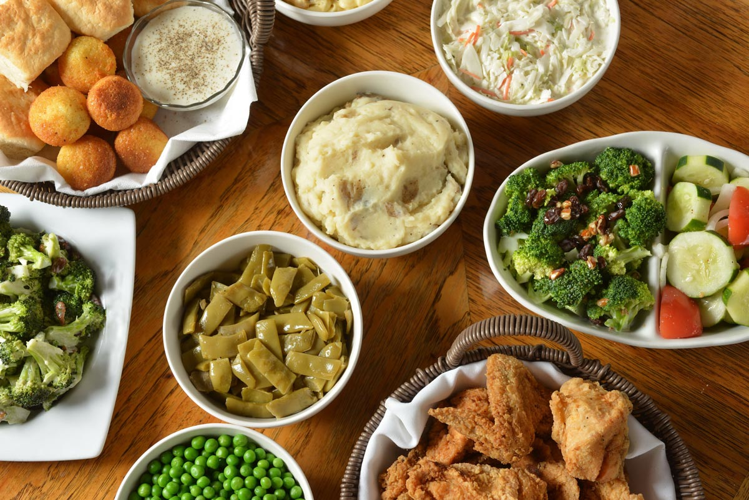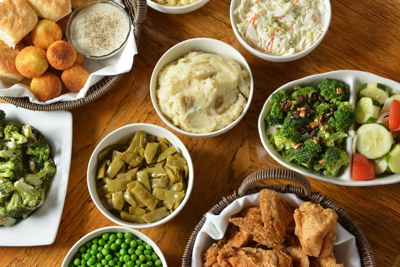
Michael King
Michael King is owner of Monell’s, the long-standing Germantown restaurant that serves Southern fare via a family style presentation. Also the festival director of Oktoberfest, King opened Monell’s in 1995.
In addition, Monell's at the Manor operates on Murfreesboro Pike, and Cafe Monell's is located in Berry Hill.
The Post recently solicited his thoughts regarding how the local restaurant industry might bounce back related to COVID-19.
You believe the food chain, the system that supplies local restaurants, has been greatly damaged, if not destroyed. Why?
There are over 1 million restaurants in the U.S. today, not including bars, pubs, breweries, catering companies, hospitals, hotels, school cafeterias, prisons, nursing homes and other food-related places that all rely on the same food chain. Imagine, if you will, one day you are providing food and services to all these entities, and then — overnight and without warning — it all evaporates. And this doesn’t happen in the U.S. only. Now think about it globally.
Then the week turns into two and then four and now eight weeks of no food pumping through this system. The well runs dry. That is what is happening now. Farmers destroying their crops because the once-thriving business of providing produce and milk and milk products are no longer being bought. The poultry, pork and meat packaging plants have been closed or are now harboring some of the most contagious employees with COVID-19 in each of these plants in numbers that surpass the nursing home population, therefore affecting the production and distribution of these products. The drivers that transport these products from fields to shelves are no longer operating due to the major drop in business. Now you have a supplier chain that is severely broken.
Take it one step further. We talked about overnight the business going away. Now talk about overnight, all these businesses open up at the same time, expecting supplies and service that they had before this pandemic, in a supply chain that has been empty for eight weeks. Now you will have massive shortages that we have never experienced in modern history. You have a lack of employees to provide these services, a lack of product due to the fact that farmers were forced to destroy their product, meat packaging houses that have a reduced labor pool due to illness. And what you now have is a vacuum of negative commodities available to those that need it to open.
All the while, more and more restaurants and bars start opening up, adding massive pressure on a system already in trouble. Do I think the supply chain is destroyed? No, but it is severely hampered. Will it get up to speed quickly? No, because the many cogs of this wheel have either no inventory to provide or have to produce new inventory that will take several months. In addition, the farmers providing the supplies that once filled the orders — many are small mom-and-pop producers — are bankrupt or closed. Will the supply chain recover? Yes, but not at the pace that I am afraid will prevent frustrations and aggravation to the buyers of these products and the end user — who is the person eating in and paying for the food items.
What does this mean for area restaurants?
This means that food prices will increase for raw items needed to produce a menu. Beef and pork will be almost three times higher than the prices were just eight weeks ago. Now restaurants will be faced with a major decision: Open up right away and have to either adjust their prices to reflect the significant food costs, or lose their customers because they have to raise their prices on a population that has been out of work for a long while. This means that simple items like spinach or hamburger or even pork chops come at a risk of being limited-supply, or not arriving at all when ordered because of shortages.
This creates a daily headache for the restaurants, when each day they have to omit items from the menu due to the shortages or have to “86” items off the menu more frequently.
Let’s say it is six months from now. What is the best-case scenario for the industry?
As a restaurateur, I have to rely on science and not on politicians or politics. I am always an optimist; however, here I would tell you there will not be a best-case scenario in six months. People have already taken the liberty to express their “rights” and forgo what experts and health officials have required about social distancing and not congregating in large groups, risking this virus to expand. I saw again this week a local bar/restaurant with over 100 people all piled together drinking and talking like this never happened. As long as this continues and [with] the lack of understanding by some ignorant people, the best we can hope for is that we will be able to remain open in six months.
What the industry can hope for in six months is that the improvement of shortages of food items will be semi-rectified in order to at least produce the basics of items.
Similarly, what is the worst-case scenario six months from now?
The worst-case scenario has already begun. People going back into some bars and restaurants like nothing has ever happened. Packing in places that 1) forces employees to work without the assurances of a healthy, virus-free environment. 2) the demand for products that keep low-paying employees in plants that have the highest infection rates forced to produce items for a population that had no care or understanding where these products come from or who is harmed to produce these products. 3) the mandated closures of bars and restaurants again when this comes around — and it will come around. Places that open now will be closed again in three to four months, no question about it. And those that close again will not open a second time.
What are your thoughts on reopening now at the Metro-mandated 50 percent capacity?
Whoever came up with this ridiculous policy knows nothing about running a restaurant or bar.
You’re asking us to take 50 percent income while paying 100 percent for expenses. You’re asking us to take 50 percent income when we are still paying the six different taxes it takes to conduct a restaurant or bar, 100 percent takes on unemployment benefits, 100 percent on sales tax, 100 percent on rent and utilities, as well as 100 percent on payroll and payroll taxes, etc. And now you come to me and say this: On top of your not getting income for over two months and being allowed to now open at just 50 percent, I’m going up on your property taxes 32 percent.
This proposed property tax hike is a head-scratcher, especially with the amazing growth since 2014-15.
I have a mandate to close my business, lay off my employees and then reopen at only 50 percent and for doing such a great job, we are adding another 32 percent tax increase so we can pay for services and put money in a rainy-day fund. Is this not a rainy day?? How “rainier” does it need to get? How many more restaurants close before someone realizes that boosting shuttered restaurants and bars with financial support bring these entities back online, which brings in sales tax and liquor tax. By not doing this, you risk the shuttered locations to be closed forever — wiping out the available taxes generated to help the economy. But what do I know? I just fry chicken.
So what would you propose?
You can’t mandate something this extreme without some type of program to offset this liability.
1. Discard the personality tax (a.k.a. personal property taxes) on businesses. This tax has never made sense. It is a tax that all businesses pay every year on items used in everyday business such as phone equipment, computers, silverware, etc., that we already have paid taxes on but have to pay a percentage on the same items each month.
2. Remove the privilege tax, which we have to pay just to have the privilege of having a business open in Tennessee.
3. Remove the franchise and excise tax for one year.
4. Allow a portion of the collected sales tax to offset the expected reduction in revenue due to the mandated 50 percent capacity limit. Collecting a dime instead of a dollar is better than not collecting anything. Remember, the state might be getting less from the restaurants. However, the taxes collected from the purchase from the supply chain — entities such as farmers and restaurant supply businesses — can offset those reduced tax collections.
5. Allow employees to maintain a portion of their unemployment benefits while working. This helps the restaurants more effectively, and reasonably, create consistent employment for those workers and helps reduces turnover. It also will provide employees a back-stop for the slow beginning of the reopening.
Any other thoughts?
My employees’ health and safety and that of their families far surpasses my desire to open and try to make a profit.
Science triumphs over politics. Period. No money is worth the safety of a person’s life. None.
If you own a restaurant, don’t damage your reputation by opening up too soon. Allow the food supply chain to get pumped and operating before adding to the problem.
Be bold and take a stand. If you believe it is too soon, then it is — no matter what the pressures are. It is easier to watch, wait and observe than to be the guinea pig.
Your actions today will affect the outcome of this situation at hand. The road will not be easy; however, it does not have to be impossible. The safety and well-being of everyone rests on the shoulders of everyone. This will be difficult, but not impossible. After all, we are hospitality providers; this is what we do for a living.







